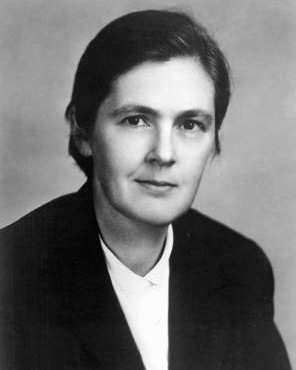Frances Kelsey - The Woman Who Stopped Thalidomide
Pharmacologist
Born: July 24, 1914, British Columbia, Canada
Died: August 7, 2015, London, Canada
Frances Kelsey was a Canadian-born pharmacologist who, as a new employee at the U.S. Food and Drug Administration in 1960, protected public health by standing firm against corporate pressure.
Frances was a Canadian-born doctor and scientist who changed the way medicines are approved in the United States. She is best remembered for stopping the dangerous drug thalidomide from being sold in America, a decision that saved thousands of babies from being born with severe birth defects.
Frances was born on July 24, 1914, in Cobble Hill on Vancouver Island, Canada. Her father was Australian, and her mother was Scottish. Frances, called “Frankie” by her family, loved learning and science from a young age. She learned to read by listening to her mother teach her older brother, and she graduated from high school at only 15 years old. By age 20, she had earned a Bachelor of Science degree at McGill University in Montreal. Since jobs for women scientists were scarce during the Great Depression, she stayed in school and earned a master’s degree in pharmacology the next year. With encouragement from a professor, she went to the University of Chicago, where she became the first woman to earn a PhD in pharmacology.
At Chicago, Frances worked with scientists studying dangerous medicines. In 1937, she helped investigate the deaths of more than 100 people who had taken a new drug called Elixir Sulfanilamide. The sweet-tasting medicine had been mixed with a toxic chemical found in antifreeze. This tragedy led to a new U.S. law requiring drug makers to test medicines for safety before selling them. Later, Frances also studied how drugs could affect unborn babies, which became very important for her future work.
In 1943 Frances married Dr. Fremont Kelsey, a fellow scientist. The couple had two daughters. Frances continued her career, earned her medical degree, and worked as an editor for the Journal of the American Medical Association. She noticed that many medical papers claimed drugs were safe without offering solid scientific evidence, something that would guide her later career.
By 1960, Frances and her family had moved to Washington, D.C., where she took a job at the U.S. Food and Drug Administration (FDA). One of her first assignments was to review a new drug application for a sedative called thalidomide, which was being promoted under the name Kevadon. The company selling it claimed it was so safe that even pregnant women could take it for morning sickness. In Europe, Asia, and other parts of the world, thalidomide was already being widely used.
At the time, FDA rules allowed new drugs to be automatically approved within 60 days if no objections were raised. Most thought Frances would simply sign off on the application. But as she reviewed the evidence, she found missing data and troubling signs. She suspected the drug could harm unborn babies. When the company sent representatives to pressure her, she refused to back down. Over the next year and a half, the company visited her office nearly 50 times, trying to get approval. Frances stood her ground, demanding better studies and stronger proof of safety.
Meanwhile, in countries where thalidomide was already sold, thousands of babies were being born with severe deformities. Many had shortened arms and legs, sometimes called “seal limbs.” Others were stillborn. As the evidence grew, more countries began pulling thalidomide off the market. Finally, in 1961, the U.S. company withdrew its application. Thanks to Frances’s courage and persistence, the United States avoided a major medical tragedy.
In 1962, Congress passed the Kefauver, Harris Amendment, which required stricter testing and proof of both safety and effectiveness before any drug could be sold. This law completely changed how medicines are approved in America, making the process far more protective of patients. President John F. Kennedy awarded Frances the President’s Medal for Distinguished Federal Civilian Service, calling her work a service to all Americans.
Frances continued to work at the FDA for decades. She led investigations into drug safety, pushed for stronger scientific standards, and helped protect patients from dishonest or careless medical practices. She received many honors, including induction into the National Women’s Hall of Fame in 2000. In 2010, the FDA created the Dr. Frances O. Kelsey Award for Excellence and Courage in Protecting Public Health in her honor.
Frances Kelsey lived to be 101 years old, passing away in 2015. Her life shows the power of one determined person to stand up for what is right. By refusing to be pressured and by insisting on strong science, she saved countless children and families from heartbreak. Frances Kelsey will always be remembered as the doctor who protected America from thalidomide.
SOURCES:
Commissioner, Office of the. “Frances O. Kelsey.” U.S. Food and Drug Administration, FDA, www.fda.gov/about-fda/fda-history-exhibits/frances-oldham-kelsey-medical-reviewer-famous-averting-public-health-tragedy.
Erick, Miriam. “Frances Kathleen Oldham Kelsey.” National Women’s History Museum, www.womenshistory.org/education-resources/biographies/frances-kathleen-oldham-kelsey.
Keywords: Science, Innovation, Courage, Perseverance, Responsibility, Honesty, Make a Difference, Stand Up for Your Beliefs
Image Citation: Public Domain
- Collections: Leader: Conscience, Spotlight Heroes 2026, STEAM Unsung Heroes, Unsung Heroes

